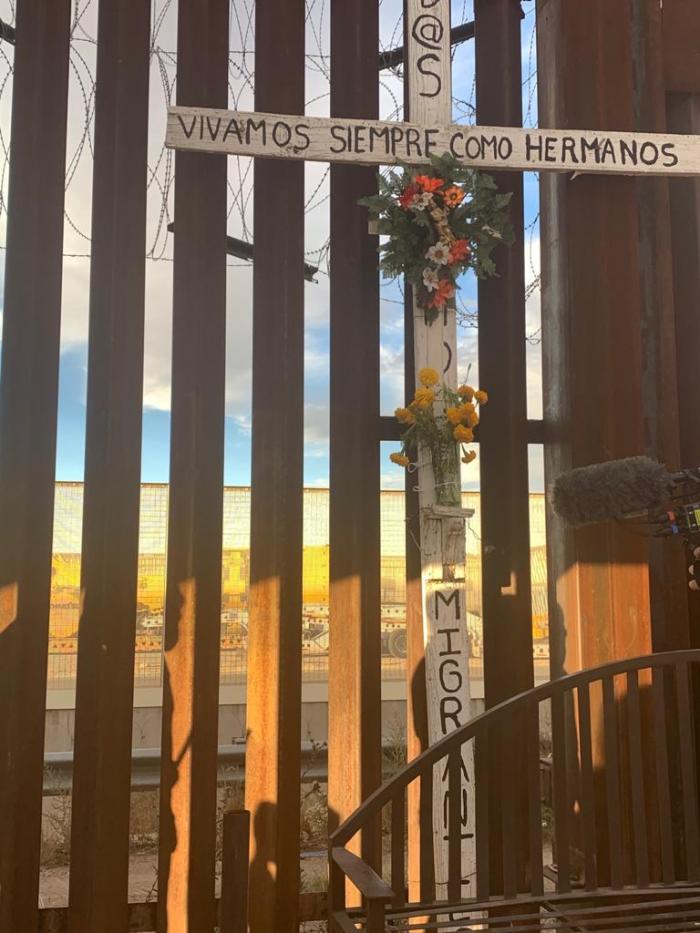Many people, both migrants and residents in Agua Prieta, Sonora, Mexico, have been suffering since the Covid-19 virus arrived. The pandemic has not only affected the public health sphere but also resulted in the closure of the US/Mexican border, affecting migrants and almost everyone who is not a US citizen. Before, people with a US visa could cross freely to visit friends and family, go shopping, and take care of business. Even though the process was slow, asylum seekers could eventually present their case to enter the US. But now, most US visitors and volunteers have stopped coming to the border, which has resulted in a loss of income and person power to do humanitarian work. Also, people have lost jobs and cannot feed their families, and no one is safe from the virus.
So, how have the people of Agua Prieta coped during this challenging time? They have responded with a resilience that shows hope for better times and faith in the future.
Since March, the population at CAME (Centro de Atención Migrante Exodus) migrant center has ranged from about 35 to less than 20 people. Several families left the shelter, and one new family arrived. Only a few local volunteers have been allowed inside. At one point in the summer, many residents and a few volunteers had contracted Covid-19, but all have recovered.
Some of the residents at CAME – which is housed in the Sagrada Familia Catholic Church – can now leave the shelter daily to work at various jobs. A very small staff still comes daily to provide support for the families and offer activities for everyone. The children still participate in language and math lessons, everyone enjoys art and recreational events, and the migrants join with the church congregation in celebrating their faith.
One particular event that brought together people from the shelter, the church, and the community took place on 2 November to celebrate Dia de los Muertos. In Latin American cultures, it is a day to remember loved ones who have died, and in the migrant community, it is a day to remember everyone who has died in the desert trying to enter the US. People gathered at the border wall wearing masks and painted faces to call out the names of the dead which were painted on crosses, and to join together, saying, “Presente!”
In every way possible, the migrants and staff have continued with life. They have found ways to create something new rather than to be defeated and lose hope.
Coffee Justo is another partner organization and friend of CPT in Agua Prieta that has refused to be defeated. This Mexican cooperative grows coffee in the southern state of Chiapas and roasts and sells the coffee in Agua Prieta. When coffee sales to the US slowed because of the pandemic, the folks at Coffee Justo started selling coffee on the streets from a small food wagon and launched a new mail-order campaign. The promotion offered coffee for a few extra dollars, which Coffee Justo would donate to other organizations whose members and neighborhoods were not getting enough to eat. This campaign resulted in Coffee Justo selling more coffee and some hungry people getting more food.
One group that received food grants was DouglaPrieta Trabajan, a women’s cooperative for gardening, cooking and sewing. The women were able to keep their families fed and to share with other families in their neighborhood. These women also figured out how to keep earning money by sewing even though much of their additional income sources had dried up. Since last spring, they have sewed thousands of masks that have been sold, mostly in the US.
Finally, the most apparent sign of resilience in Agua Prieta is project expansion and the beginning of new projects. For example, Coffee Justo, along with the Coffee Justo y Mas Coffee, continue to grow their operation. They are adding a small new storage room/restroom building and building a new commercial kitchen in the Presbyterian Church across the street as they continue with their plans to begin serving food at the coffee shop.
Another sign of construction is the new migrant shelter at the Sagrada Familia Church’s previous education building. In the last year, workers built the outside wall and renovated the classrooms into bedrooms. The final construction is now close to completion. The director recently said the building might have been finished by now, but all the construction workers in town are busy with other projects.
The realities of life have changed for the migrant community at CAME, the folks at Coffee Justo, and the women of DouglaPrieta. They are facing reduced income and the constant threat of the Covid-19 virus. They have been forced to redirect and re-evaluate their plans for the future. Yet, in different ways, they have all done just that. They have continued the parts of their lives that were most important by adapting and changing when necessary. They have reached out to others who had less. They have worn masks and made masks. And they have continued to build for the future. They will flourish and grow in new buildings, and the migrants will – one day – be able to continue their journeys to a new life.




